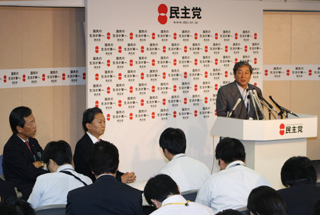The G8 summit meeting in Italy this year suggested concluding the Doha Round by the end of 2010. The timing for the new DPJ government could not be more favourable. Its first major political hurdle – the July 2010 Upper House elections will be over and winning farmers’ votes will not be an issue again until 2013. In the resumed WTO negotiations, Japan will encounter strong pressure to lower tariff rates on agricultural products. This will inevitably extend to ‘sensitive items’ including key Australian exports such as wheat, dairy products, beef and sugar.
The DPJ government can also expect increasing domestic pressure from industrial exporters. The risks of failure are too high, according to Masayoshi Honma, Professor of Agricultural and Resource Economics at Tokyo University: ‘we could lose both manufacturing and agriculture’. The benefits from a WTO trade agreement are not confined to large Japanese firms. The president of a small electronics company in Tokyo was quoted as saying, ‘Exports are one of a few survival strategies for us’.
The business sector expects external pressure to facilitate evolution of the country’s agricultural sector. Rice, for example, accounts for only 1 per cent of Japan’s GDP and is equivalent to the total production of one manufacturer (Panasonic). Privileging the defence of rice comes at the expense of major potential benefits to other sectors, let alone improved relationships with foreign trade partners.
Clearly the agricultural sector will have to be compensated against losses from market opening. The DPJ’s policy of direct income compensation for farm households anticipates this. Aimed squarely at winning over farm voters in the recent elections, it is also designed to support the DPJ’s policy of promoting both WTO and FTA negotiations. The scheme was devised by Ichiro Ozawa, the architect of the DPJ’s stunning electoral triumph and incoming DPJ Secretary-General. He was very angry with his own party when it changed its manifesto on the Japan-US FTA. He thinks FTAs will not damage individual farmers as long as their income is supported.
The DPJ’s victory is significant in other respects. It has destroyed the ‘agricultural policy triangle’ that has been blocking reform in the agricultural sector for decades. The ‘tribe’ of ruling Liberal Democratic Party agricultural policy experts in the Diet (norin zoku in Japanese), the agriculture ministry (MAFF), and the agricultural cooperative organisation (Japan Agriculture, or JA), effectively made policy for agriculture. In particular, the norin zoku were a critical veto point for reform and will play no role in a DPJ government.
As for the MAFF and JA, they face a significant weakening of their policy influence. The DPJ has explicitly rejected any political and electoral connection with JA. It won farm votes with direct appeals to farmers, eschewing links with the farmers’ cooperative organisation. The DPJ has read the political trends correctly: electoral success no longer lies with organised vested interests but with floating voters, particularly urban consumers. Electoral statistics support the fact that the DPJ is a party whose main support lies in urban and metropolitan districts, not rural areas.
JA can look forward to a government by a party with a record of deliberately targeting it with proposals, including legislation, to reduce its political and economic clout. Such action will further enable a DPJ government to formulate an agricultural policy that is free from the fetters of JA’s vested interests as well as those of the agricultural policy triangle as a whole.
The MAFF will inevitably be constrained by the DPJ’s move to eliminate ‘politics reliant on bureaucrats’ and the end of the bureaucracy’s long-standing coalition with the LDP since 1955. The emergence of a new ‘bureaucracy-politics’ relationship, in which policymaking is led by the cabinet and bureaucrats are subordinate to politicians, is being welcomed by some economic bureaucrats because it will assist drastic policy reforms that have been blocked by the LDP’s policy ‘tribes’.
Japan’s new MAFF Minister, Hirotaka Akamatsu, a party apparatchik with no experience in agricultural policy, can be expected to implement faithfully party policy on agriculture. He may have a fight on his hands with the MAFF over who’s boss, but the deciding factor will be what side he comes down on in the internal party debate on agricultural trade liberalisation. Some members are arguing that the effects of drastic tariff reduction will be cushioned by the compensation program, while others are protesting that even with compensation, tariff reduction on agricultural products cannot be tolerated.
This article also appeared in the Australian Financial Review on 21 September.

